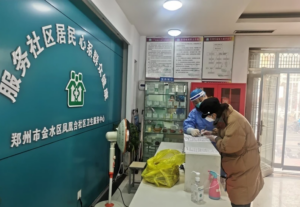
Beijing: Encourage community health service institutions to provide oxygen filling services for residents in need

The Beijing Municipal Health Care Commission and the Beijing Municipal Medical Security Bureau have jointly issued the Notice on Further Improving the Capacity of Critical Care Services. Hospitals are required to accept all patients with acute and critical illnesses transferred by 120 and not to refuse them; on the basis of strengthening community mapping of people in isolation and rehabilitation at home, organizing the distribution of oxygen clips to high-risk groups such as the elderly, self-testing blood oxygen at home and clarifying concise monitoring and warning criteria.
Full text of the notice
All district health care committees and health insurance bureaus, Beijing Economic and Technological Development Area Social Affairs Bureau, Municipal Bureau of Traditional Chinese Medicine, Municipal Medical Management Center, Municipal Emergency Center, Municipal Health and Health Big Data and Policy Research Center, Municipal Red Cross Blood Center, all relevant medical institutions.
According to the current situation of the epidemic in the city, in order to meet the demand of the public for medical treatment and to enhance the capacity of critical care services, we hereby notify the relevant matters as follows.
First, strengthen the preparation of critical care resources. According to the relevant requirements of the state and the city, expand medical resources for critical care. Second- and third-level hospitals are required to strengthen the construction of intensive care medicine departments, according to the type and level of hospitals, make preparations for comprehensive ICU beds, convertible ICU beds and intensive care units, and make preparations for drugs, equipment and supplies in advance to cope with the peak of intensive care.
Second, strengthen personnel training. Reasonably equip sufficient critical care medical forces, and equip sufficient critical care medical forces based on the total number of beds in comprehensive ICU, other specialized ICU and convertible ICU. The team of critical care physicians will be rapidly expanded, and through comprehensive ICU-related training for specialized ICU physicians, they will master the concept of critical care treatment for other systems and rapidly improve their comprehensive treatment capability. We will organize systematic comprehensive ICU training for all physicians in internal medicine, pediatrics, and emergency medicine, so that they can master the concept of critical care medicine treatment, be proficient in using ventilators, continuous renal replacement therapy (CRRT) equipment and other vital organ function support, and have the clinical ability of critical care medicine. In addition, they will be able to further train and improve the ability of the doctors who have been rotated to the ICU, and serve as a reserve for intensive care medicine.

Photo
Third, do a good job in securing blood. Take multiple measures to protect the clinical blood demand of critical patients. Each district should increase the recruitment of blood donation groups, advocate state organs, institutions and state-owned enterprises to play an exemplary leading role, mobilize public officials and unit employees to participate in blood donation activities. Do a good job of setting up and maintaining blood collection points, scientific planning of the layout of blood collection points, to facilitate the public to donate blood nearby. Blood collection points set up, do not arbitrarily remove, relocate or change its function, use, to set up the necessary publicity facilities, to carry out blood donation publicity and recruitment activities. Strengthen the refinement of medical institutions with blood management. All clinical blood institutions should scientifically develop clinical blood plans, strengthen the graded management of blood inventory, activate blood inventory warning according to the blood station warning information and the blood inventory of the institution, strengthen the regulation and control of clinical blood use and the coordination of controllable blood resources, ensure the treatment of patients with acute and critical illnesses, orderly arrange the blood demand of clinical departments, and protect the priority rights and interests of blood for blood donors and their spouses and immediate family members.
Fourth, strengthen the mapping of key personnel. Each district health and health committee should do a good job of mapping the elderly combined with basic diseases and other key personnel in the district, to find out the bottom in advance, according to the level of health risk to implement graded health management. The key people at medium and high risk, especially the elderly living alone, should be closely monitored, and if symptoms appear, timely guidance should be given for treatment; if the condition turns serious and exceeds the capacity of grassroots treatment, timely guidance or assistance should be given for referral to hospitals with the ability to save lives and resolutely prevent delay in treatment.
Fifth, strengthen home monitoring services. To rely on the district medical association and other mechanisms to strengthen early intervention, smooth referral channels. On the basis of strengthening community mapping of home isolation and rehabilitation personnel, organize the distribution of oxygen clips to high-risk groups such as the elderly, self-measurement of blood oxygen at home, and clear and concise monitoring and warning criteria. For early warning situations, the community doctor should be docked in a timely manner, and after evaluation by the community doctor, for those beyond the capacity of grassroots treatment, the patient should be quickly referred or directed to the second or third level hospitals in the district, where the hospital will give treatment and clarify the treatment plan, and then transferred back to the community or community health service institutions for follow-up treatment and rehabilitation after stabilization; all districts are encouraged to provide oxygen filling services for residents in need in community health service institutions. Facilitate residents’ home oxygen therapy. Referring to the closed oxygen inhalation fee program, the fee will be charged at the rate of 7 yuan per 40 liters filled and reimbursed according to the medical insurance regulations. Oxygen filling services only, no medical service fees.

File photo
Sixth, do a good job of docking elderly service institutions. Each district health and health committee shall designate medical institutions above the second level to be responsible for health monitoring and medical services for elderly people in nursing homes, welfare homes and other institutions, and establish referral mechanisms to ensure full coverage of health monitoring for high-risk groups and effective medical treatment for critically ill elderly people.
Seven, comprehensively improve the emergency and inpatient admission capacity of hospitals. In addition to enriching the emergency department’s treatment capacity, it is necessary to open up the admission channel between the emergency department and the inpatient department, expand the emergency admission area from the emergency detention area to the inpatient wards of various departments of the hospital, allow inter-departmental admission, and maximize the expansion of the admission capacity. Hospitals should admit all patients with acute and critical illnesses transferred by 120, and should not refuse to treat patients without nucleic acid and antigen results to affect their admission. Sufficient stretcher vehicles and wheelchairs should be allocated in emergency and fever clinics to ensure that emergency and non-emergency transfer vehicles can transfer patients in time after delivery, and shall not occupy transfer vehicles and stretcher resources. To strengthen the training and guidance of critical care and treatment of new crown patients, according to the patient’s condition, scientific and reasonable to do oxygen therapy, the use of small molecule drugs, early to prevent patients from aggravating their condition. The city health and health big data and policy research center should do a good job of monitoring and analysis of data such as critical care in each hospital. The Municipal Health and Health Commission will inform and supervise the relevant medical institutions according to the monitoring and analysis, as appropriate.


Average Rating